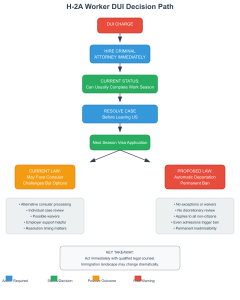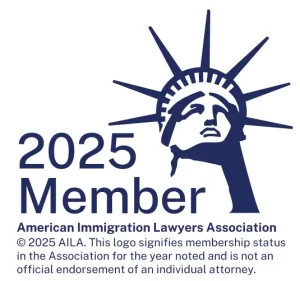
Getting charged with DUI while on an employment visa can be scary and confusing. While we don’t handle criminal defense (you’ll need a criminal attorney for that), we can help you understand how these charges might affect your immigration status.
If you’re working in the United States on an H-2A visa or another employment visa, facing DUI charges raises important questions about your ability to stay in the country and return in the future. The answers depend on both current immigration law and proposed changes that could dramatically alter the landscape for all non-citizens.
Current Immigration Impact: The Good News First
For most H-2A workers, a single DUI charge or conviction won’t automatically end your current legal status. Under existing federal immigration law, you can typically complete your authorized work period and return home as planned.
Here’s what current law says about DUI and employment visas:
Your Current Status Usually Remains Valid
- A first-time DUI without serious aggravating factors typically doesn’t make you immediately deportable
- You can generally continue working through your authorized period (usually until November for agricultural workers)
- Your employer can usually keep you employed without immigration law violations
When DUI Becomes More Serious
Some situations do create bigger immigration problems:
- Multiple DUI convictions may be considered “crimes involving moral turpitude”
- DUI involving drugs (not just alcohol) can trigger controlled substance violations
- Aggravating factors like injuries to others, very high blood alcohol, or children in the vehicle
- DUI while driving on a suspended license
The Visa Revocation Risk You Need to Know About
Here’s something many workers don’t realize: even if your current status is safe, your visa stamp can be revoked while you’re still in the United States.
What is Prudential Revocation?
The U.S. State Department can cancel your visa based on a DUI arrest – even before you’re convicted. This is called “prudential revocation,” and it’s become increasingly common since 2015.
Important facts about visa revocation:
- It can happen based on arrest alone, not just conviction
- You might not even know it happened until you try to travel
- The consulate may email you, but they don’t have to
- It typically takes effect when you leave the United States
Real-World Impact
If your visa gets revoked:
- You can finish your current work period in the United States
- But you’ll need a new visa to return next season
- The application process becomes much more complicated
Timing Matters: Why You Should Resolve Your Case Before Going Home
One of the most important things you can do is resolve your criminal case before leaving the United States. Here’s why:
Unresolved Cases Create Problems
- Pending charges may look worse to consular officers than resolved cases
- It’s nearly impossible to appear in court from South Africa
- Uncertainty about your case outcome complicates future visa applications
H-2A Workers Have Limited Time
Since H-2A visas are annual, timing is crucial:
- Most agricultural seasons end in November
- You want your case resolved before you go home
- Next year’s visa application may depend on having clear documentation
This is why you need a criminal defense attorney who understands these timing pressures. We can work with your criminal lawyer to understand the immigration implications, but we cannot represent you in criminal court.

Next Year’s Visa: The Challenges Ahead
Even with a resolved DUI case, getting your H-2A visa for next season may be more difficult.
Consular Decisions
Consulates may:
- Deny your visa application based on the DUI conviction
- Require additional documentation like court records
- Request medical examinations
- Create processing delays that affect seasonal timing
Alternative Options
If one consulate denies your application, you may have other options:
- Applying at different consular locations within South Africa
- Each consulate reviews cases independently
- Success rates vary by location and individual circumstances
Agricultural employers often work with experienced immigration attorneys to help valuable workers navigate these challenges. If you’re an employer dealing with this situation, we can help evaluate your worker’s options.
Plea Agreements and Lesser Charges
Your criminal attorney may be able to negotiate a plea to a lesser charge like reckless driving instead of DUI. Under current law, this can reduce immigration consequences.
However – and this is important – even admitting to facts that show you drove under the influence could still create problems, especially under proposed new legislation.
We can consult with your criminal attorney about the immigration implications of different plea options, but the criminal defense strategy is their expertise.
The Game-Changer: Proposed Federal Legislation
Congress is considering legislation that would completely change how DUI affects immigration status. The Jeremy and Angel Seay and Sergeant Brandon Mendoza Protect Our Communities from DUIs Act of 2025 passed the House of Representatives in June 2025.
What This Bill Would Do
If this legislation becomes law, any DUI conviction or even admission would make you:
- Automatically deportable from the United States
- Permanently inadmissible for future visas
- Ineligible for bond during removal proceedings
No Exceptions
Unlike current law, the proposed legislation would:
- Apply to first-time offenders with no prior record
- Cover all non-citizens, including legal workers
- Eliminate all discretionary considerations
- Make even admissions to DUI conduct grounds for removal
The End of Current Protections
This would eliminate:
- The ability to complete your work season after a DUI
- Options for alternative consular processing
- Consideration of individual circumstances
- All current immigration protections for DUI cases
While this legislation may not become law, it represents a continuing trend toward stricter penalties for non-citizens with criminal issues. Similar proposals are likely to keep appearing in Congress.
What You Should Do Right Now
Get Legal Help Immediately
- Hire a criminal defense attorney – This is not optional. We cannot help you with the criminal case.
- Consult with an immigration attorney – We can explain how different outcomes might affect your immigration status.
- Don’t try to handle this alone – The stakes are too high.
Focus on Resolution
- Work with your criminal attorney to resolve the case before going home
- Get all court documentation properly certified
- Complete any required programs or probation
- Keep detailed records of everything
Plan for Next Season
- Understand that next year’s visa application may be more complicated
- Work with your employer on documentation and strategy
- Consider having legal help with the visa application process
For Employers: Supporting Your Workers
Agricultural employers who have invested in training H-2A workers often want to help them return next season. Here’s how:
- Connect workers with qualified criminal defense attorneys
- Understand the immigration implications through consultation with immigration counsel
- Plan for potentially more complex visa application processes
- Consider legal assistance for valuable returning workers
If you’re an employer facing this situation, we can help you understand your worker’s options and develop a strategy for next season.
Getting Immigration Help
While we cannot represent you in criminal court, we can:
- Explain how different criminal outcomes might affect your immigration status
- Consult with your criminal attorney about immigration implications
- Help you understand visa application challenges
- Assist with waiver applications if needed
- Work with employers on strategies for returning workers
Remember
- Criminal defense first – Resolve your case with qualified criminal counsel
- Immigration planning second – Understand the long-term implications
- Act quickly – Time is limited for H-2A workers
The Bottom Line
DUI charges don’t have to end your ability to work in the United States, but they do create serious challenges that require immediate attention and professional help. Current law provides some protections, but proposed legislation could eliminate them entirely.
Don’t wait to get help. The decisions you make now about your criminal case could affect your immigration options for years to come.
This information is for educational purposes only and does not constitute legal advice for any specific situation. Every case is different, and you should consult with qualified attorneys about your specific circumstances.
Need help understanding how criminal charges might affect your immigration status? Contact us for a consultation. We serve agricultural workers and employers throughout Montana, North Dakota, Wyoming, and the broader Rocky Mountain region.
